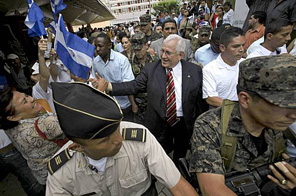Micheletti willing to step down
TEGUCIGALPA: Honduras' interim leader said Wednesday he is willing to step down to help end his country's political crisis, but only if ousted President Manuel Zelaya isn't allowed to regain power.
Roberto Micheletti also accused unspecified groups of handing out weapons and planning an armed rebellion, and his government reinstated an overnight curfew. The move came a day after Zelaya called for an insurrection in Honduras.
Micheletti, the former congressional leader who was selected by lawmakers to serve out the final six months of Zelaya's term, presented the resignation offer as a means to end the nearly three-week standoff over Honduras' military-backed coup.
The interim president said he was willing to leave office "if at some point that decision is needed to bring peace and tranquility to the country, but without the return, and I stress this, of former President Zelaya."
The offer was presented by a Honduran delegation to the Washington-based Organization of American States, Micheletti told reporters in Tegucigalpa. It was unclear if the OAS had received the proposal.
Zelaya was not immediately available for comment, but the offer appeared unlikely to resolve the standoff over the June 28 coup, in which soldiers seized Zelaya and hustled him out of the country on a plane. Talks on ending the crisis are expected to resume Saturday in Costa Rica.
If Micheletti were to resign, under Honduran law the presidency would pass to Supreme Court President Jorge Rivera. The Supreme Court backed the coup.
Zelaya has insisted that he intends to return as president, saying that point is not open to negotiation. On Tuesday, he said Hondurans had a right to stage an insurrection against Micheletti's internationally isolated government.
Asked about the possibility of an armed rebellion, Micheletti said: "I don't think we will get to that point. Our country is peaceful. I don't believe Hondurans will pick up arms to kill other Hondurans."
However, he charged that some people were trying to foment a rebellion. "This morning we were informed that they were handing out some guns," Micheletti said, without specifying who "they" were.
A few hours later, Micheletti's administration announced in a broadcast statement that it was imposing a new midnight-5 a.m. curfew, calling it a response to "continuing and open threats by groups looking to provoke disturbances and disorder." It had imposed a nightly curfew after Zelaya's ouster, but lifted the order Sunday morning, saying it had succeeded in bringing calm to Honduras.
Micheletti, a member of Zelaya's own political party, was named by Congress to serve out the presidential term after Zelaya was accused of violating Honduran law by ignoring the courts and Congress in pressing ahead with plans for a constitutional referendum viewed by many as a power grab. Zelaya denies he was seeking to change the constitution so he could serve another term.
The interim president has threatened to jail Zelaya, a wealthy rancher who shifted to the left after being elected, if he comes back to Honduras.
Demonstrations for Zelaya's return continued in Tegucigalpa on Wednesday and his supporters called for labor strikes.
Labor leader Israel Salinas, one of the main figures in the pro-Zelaya movement, told thousands of demonstrators who marched through the capital that workers at state-owned companies plan walkouts later this week.
He said protest organizers were talking with union leaders at private companies to see if they could mount a general strike against Micheletti. Salinas also said sympathetic unions in neighboring Nicaragua and El Salvador would try to block border crossings later this week "in solidarity with our struggle."
At the five-hour protest, tempers were high. Demonstrators threw rocks at a government building that houses the country's womens institute. Police showed up but no injuries were reported.
"We are going to install the constitutional assembly. We are going to burn the Congress," protest leader Miriam Miranda vowed.
Costa Rican President Oscar Arias is mediating talks aimed at resolving the impasse, but Zelaya has grown frustrated by the lack of progress.
The talks are scheduled to resume Saturday after two earlier rounds failed to produce a breakthrough. Arias, who won the 1987 Nobel Peace Prize for his efforts in ending Central America's wars, has urged Zelaya to "be patient."
A Gallup survey in Honduras said Zelaya is more popular than Micheletti, but it also indicated a deeply divided nation.
The nationwide survey made after Zelaya was exiled said 46 percent of those polled had a favorable opinion of Zelaya, while 30 percent had a similar view of Micheletti. Yet Zelaya was opposed by about the same proportion as his support — 44 percent — a figure not much different from the 49 percent who had negative feelings about Micheletti.
The survey was taken June 30-July 4 and had a margin of error of three percentage points, according to CID-Gallup, which is based in Costa Rica.






